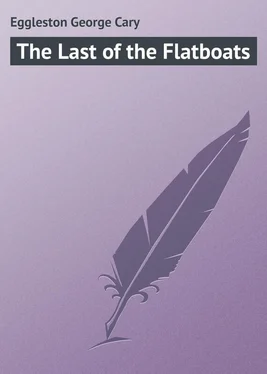George Eggleston - The Last of the Flatboats
Здесь есть возможность читать онлайн «George Eggleston - The Last of the Flatboats» — ознакомительный отрывок электронной книги совершенно бесплатно, а после прочтения отрывка купить полную версию. В некоторых случаях можно слушать аудио, скачать через торрент в формате fb2 и присутствует краткое содержание. Жанр: foreign_prose, на английском языке. Описание произведения, (предисловие) а так же отзывы посетителей доступны на портале библиотеки ЛибКат.
- Название:The Last of the Flatboats
- Автор:
- Жанр:
- Год:неизвестен
- ISBN:нет данных
- Рейтинг книги:5 / 5. Голосов: 1
-
Избранное:Добавить в избранное
- Отзывы:
-
Ваша оценка:
- 100
- 1
- 2
- 3
- 4
- 5
The Last of the Flatboats: краткое содержание, описание и аннотация
Предлагаем к чтению аннотацию, описание, краткое содержание или предисловие (зависит от того, что написал сам автор книги «The Last of the Flatboats»). Если вы не нашли необходимую информацию о книге — напишите в комментариях, мы постараемся отыскать её.
The Last of the Flatboats — читать онлайн ознакомительный отрывок
Ниже представлен текст книги, разбитый по страницам. Система сохранения места последней прочитанной страницы, позволяет с удобством читать онлайн бесплатно книгу «The Last of the Flatboats», без необходимости каждый раз заново искать на чём Вы остановились. Поставьте закладку, и сможете в любой момент перейти на страницу, на которой закончили чтение.
Интервал:
Закладка:
“And I’ll obey you, Phil! Thank you, and God bless you! Be sure I could never hate you or do anything but love you, and you must always know that I understand.”
Then the two turned away from each other.
On their return to Vevay a few evenings later, Ed said to his mother: —
“You were right, mother; responsibility has already worked a miracle in Phil’s character.”
“No, you are wrong,” said the wise mother. “It is only that you have never quite understood your brother until now. Nothing really changes character – at least nothing changes it suddenly. Circumstances do not alter the character of men or women or boys. They only call out what is already there. Responsibility and his great affection for you have not changed your brother in the least. They have only served to make you acquainted with him as you never were before.”
“Be very sure I shall never misunderstand him again!” said the boy, with an earnestness not to be mistaken.
CHAPTER VI
THE PILOT
The boys went hurriedly back to Vevay. They had cargo enough and to spare. Indeed, they feared they might have difficulty in bestowing it all on their boat. And the rise in the river was coming even earlier and faster than Phil had calculated. They must get the Vevay part of their load on board and drop down to Craig’s Landing before the water should reach their freight there, which lay near the river. So they hired a farm hand to watch the goods at the landing and hastened to town.
There they worked like beavers, getting cargo aboard, for it was no part of their plan to waste money hiring anybody to do for them anything that they could do for themselves. They loaded the boat under Perry Raymond’s supervision, for even the tightest and stiffest boat can be made to leak like a sieve if badly loaded.
Finally, everything was ready. The town part of the cargo was well bestowed. Ed Lowry had deposited his books on top of tiers of hay bales, in between barrels, and in every other available space, for there was no room for them in the little cabin at the stern, where the boys must cook, eat, sleep, and live. The cabin wasn’t over twelve feet by ten in dimensions, and a large part of its space was taken up by the six sleeping-bunks. For besides themselves there was a pilot to be provided for.
His name was Jim Hughes. Beyond that nobody knew anything about him. He had come to Vevay, from nowhere in particular, only a few days before the flatboat’s departure, and asked to be taken as pilot. He was willing to go in that capacity without wages. He wanted “to get down the river,” he said, and professed to know the channels fairly well.
“If he does,” said Ed Lowry, “he knows a good deal more than most of the old-time flatboat pilots did. With the maps I’ve secured I think we can float the boat down the river without much need of a pilot anyhow. But as Hughes offers to go for his passage, we might as well take him along. We may get into a situation where his knowledge of the river, if he has any, will be of use to us.”
So Jim Hughes was shipped as pilot of The Last of the Flatboats .
When all was ready that gallant craft was cast loose at the Ferry street landing, and as she drifted into the strong current, there was a cheer from the boys on shore who had assembled to see their schoolmates off.
“She floats upon the bosom of the waters,” cried Irv Strong, “with all the grace of a cow learning to dance the hornpipe.”
Irv was in exuberant spirits, as he always was in fact. He was like soda water with all its fizz in it, no matter what the circumstances might be, and just now the circumstances were altogether favorable.
“I say, boys,” he cried, “let’s have a little dance on deck! Tune up your fiddle, Constant.”
Constant dived into the cabin and quickly returned with his violin, playing a jig even as he emerged from the little trap-door at the top of the steps.
Phil did not join in the dance, for he had discovered a cause of anxiety. Their pilot was making a great show of activity where none whatever was needed. From the Ferry street landing to “The Point” the current ran swiftly in a straight line, and if let alone, the boat would have gone in precisely the right direction. But Hughes was not letting her alone. With long sweeps of his great steering-oar he was driving her out dangerously near the head of the bar, now under water but still a shoal.
Phil, who was observing closely, called out: —
“I say, Jim, you must run further inshore, or you’ll hit the head of the bar.”
“Lem me alone,” said Jim. “I know the river.”
Just then the boat scraped bottom on the bar. Phil called out quickly: —
“All hands to the larboard oars! Give it to her hard!” and himself seizing the steering oar, he managed by a hair’s breadth to swing the great box – for that is all that a flatboat is – into the deep and rapid channel near the Indiana shore.
As she drifted into safe water, Phil said: —
“That’s incident number one in the voyage.”
“Yes, and it came pretty near being chapter first and last in the log-book of The Last of the Flatboats ,” replied Irv Strong.
For several miles now there was nothing to do but float. But Phil was closely watching Jim Hughes and observed that that worthy made three visits to the hold, – as the cargo part of the boat is called, – going down each time by the forward ladder and not by the stairs leading to the cabin.
When the boat reached the big eddy about half a mile above Craig’s Landing, it was necessary for all hands to go to the oars again in order to make the landing.
Presently Phil observed that Hughes was steering wildly. His efforts with the steering oar were throwing the boat far out into the river, away from the shore on which they were to land, and directly toward the head of a strong channel which at this stage of water ran like a mill-race along the Kentucky shore on the farther side of Craig’s bar. Should the boat be sucked into that channel, she would be carried many miles down the stream before she could ever be landed even on the wrong side of the river, and she could never come back to Craig’s Landing unless towed back by a steamboat.
Phil, seeing the danger, asked: “Why don’t you keep her inshore?”
“None o’ yer business. I’m steerin’,” answered the pilot.
One quick, searching glance showed Phil the extent of the man’s drunkenness, – or his pretence of drunkenness, – for Phil had doubts of it. There were certain indications lacking. Yet if the fellow was shamming, he was doing it exceedingly well. His tongue seemed thick, his eyes glazed, and his walk across the deck appeared to be a mere stagger, supported by the great oar that he was wielding to such mischievous effect.
There was not a moment to be lost if the landing was to be made at all. Phil called all the boys to the larboard sweep and went to take possession of the steering-oar. Jim Hughes resisted violently. Phil, with a quietude that nobody had ever before seen him display under strong excitement, picked up a bit of board from the deck, and instantly knocked the big hulking fellow down by a blow on the head.
The man did not get up again or indeed manifest consciousness in any way. If this troubled the boy, as of course it must, he at least did not let it interfere with his duty. He had a difficult task to do and he must do it quickly. He gave his whole mind to that. The boys obeyed with a will his shouted orders to “pull hard!” then for two of them to go to the starboard oar and “back like killing snakes.” In a little while the boat swung round, and Phil called to Will Moreraud to “take a line ashore in the skiff and make it fast.” The youth did so, just in time to prevent the boat from grounding in the shoal water below the landing.
Читать дальшеИнтервал:
Закладка:
Похожие книги на «The Last of the Flatboats»
Представляем Вашему вниманию похожие книги на «The Last of the Flatboats» списком для выбора. Мы отобрали схожую по названию и смыслу литературу в надежде предоставить читателям больше вариантов отыскать новые, интересные, ещё непрочитанные произведения.
Обсуждение, отзывы о книге «The Last of the Flatboats» и просто собственные мнения читателей. Оставьте ваши комментарии, напишите, что Вы думаете о произведении, его смысле или главных героях. Укажите что конкретно понравилось, а что нет, и почему Вы так считаете.












